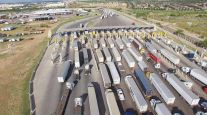State Dept. Travel Warning Is Latest Mexico Truck Hurdle
This story appears in the May 23 print edition of Transport Topics.
Cross-border trucking between the United States and Mexico, already beset by political issues and road-safety concerns, faces a serious new problem in the form of a warning from the U.S. State Department.
The State Department recently issued a severe new warning about traveling in Mexico, citing growing concern about violent crime on highways, much of it related to illegal narcotics. This warning could seriously affect commerce with the United States’ third-largest trading partner.
Warning in particular against night travel in an April 22 advisory, the State Department told potential travelers “it is imperative that you understand the risks involved in travel to Mexico and how best to avoid dangerous situations.”
The State Department said incidents have occurred at all hours and on toll highways as well as secondary roads. “To reduce risk, you are strongly urged to travel only dur-ing daylight hours throughout Mexico, to avoid isolated roads, and to use toll roads whenever possible,” according to the advisory.
Trucking is particularly affected because trucks carry much of the rapidly growing surface freight between the two countries. Imports from Mexico by truck jumped 17.3% last year to $123 billion, and truck exports to Mexico climbed 21.8% to $175.59 billion, according to data from the Department of Transportation’s Bureau of Transportation Statistics.
Two major manufacturers of Class 8 trucks — Navistar Inc. and Daimler Trucks North America — have key facilities in Mexico, as do important suppliers to the OEMs, along with thousands of other manufacturers.
Many large U.S.-based trucking carriers also have operations in Mexico, but most declined to comment.
The State Department said the violence was getting worse: “34,612 people have been killed in narcotics-related violence in Mexico since December 2006,” the report said. “More than 15,000 narcotics-related homicides occurred in 2010, an increase of almost two-thirds compared with 2009.”
One owner of a small carrier in the United States said, on condition he not be identified, that all of his drivers refused to enter Mexico. He asked that not even the name or location of his fleet be disclosed. He said he could not answer whether he would apply for a proposed new cross-border trucking program the United States is moving to implement.
On the other hand, Celadon Group, which owns a Mexican trucking company, said that security has not been a major problem.
“Essentially . . . crime related to the drug wars really hasn’t hurt the economy,” Stephen Russell, Celadon’s chairman, told Transport Topics. “I was in Mexico recently . . . and trade between the U.S. and Mexico was up, both imports and exports, with trucking up 9% year-over-year in February.”
Russell said that Celadon’s subsidiary Servicios de Transportacion Jaguar S.A. de C.V. ran full truckload services throughout Mexico without any special security problems.
“We have done the right thing from the security standpoint,” Russell added, declining to comment further.
Joachim Bamrud, executive editor of the Latin Business Chronicle, based in Miami, said the “sheer volume” of trade overwhelms security problems.
“Yes, there are security concerns, but trade between the two countries has jumped strongly this year, because the economies of both the United States and Mexico are recovering from the recession, and I think you are bound to see a dramatic increase in trade, independent of this travel warning,” Bamrud told TT.
According to DOT, U.S.-Mexico surface transportation trade totaled $320.3 billion in 2010, an increase of 27.6% from 2009.
Martin Rojas, American Trucking Associations vice president for security and operations, said security concerns have grown in Mexico but they were not the top priority.
“Mexican carriers I’ve talked to say that they’ve seen a bit of an increase in the security arena, but that has always been an issue for some time,” Rojas told TT.
A more important problem, Rojas said, is the time consumed crossing the border, which may take “a few hours, a day or more to get cargo cleared.”
Navistar spokesman Roy Wiley said the company builds its ProStar over-the-road tractors in Escobedo, near the northern industrial city of Monterrey, but also at Garland, Texas, but he declined to disclose numbers or percentages of output at the Mexican plant.
“We monitor very closely all the roads leading to and from our facility in Escobedo,” Wiley told TT. “We have chosen the safest routes, and these are changed from time to time. We have not had an incident to date.”
Trailer manufacturer Hyundai Translead has its headquarters in San Diego and a factory across the border with Mexico in Tijuana, Baja California.
“In 2009, we recommended certain steps for our employees to start taking to make their trips to Mexico more secure,” Glenn Harney, Hyundai’s chief sales officer, told TT.
“Some common-sense steps such as traveling only in daylight hours and traveling in groups rather than alone were initiated,” he said.
DTNA spokeswoman Amy Sills said that Daimler makes Freightliner Cascadias in its Saltillo plant, and Freightliner M2, 114SD, Coronado and Columbia models at its Santiago factory.
Freightwatch Inc. warned in a May 9 report that although most drug violence was not aimed at the transport industry, cargo theft crime was increasing. Reports in the first quarter “indicated that some truck drivers, fearing for their lives, are resisting traveling to hot spots such as Ciudad Juarez and Monterrey,” Freightwatch said.




